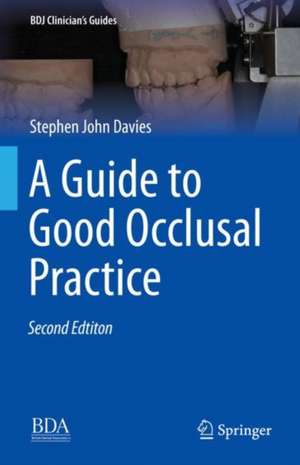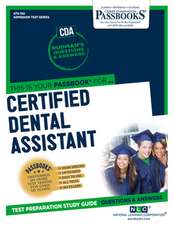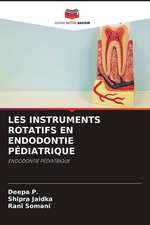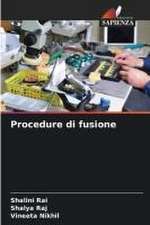A Guide to Good Occlusal Practice: BDJ Clinician’s Guides
Autor Stephen Daviesen Limba Engleză Hardback – 14 mar 2022
Today it remains the case that many dentists feel that occlusion represents an important gap in their knowledge; indeed, some qualify with little more than the belief that “occlusion is important”. Their vulnerability in this area of clinical practice is confirmed when early cases fail to go as well as hoped. In providing comprehensive guidance on good occlusal practice in different contexts, this book will be of value for a wide range of dental practitioners.
| Toate formatele și edițiile | Preț | Express |
|---|---|---|
| Paperback (1) | 711.40 lei 38-44 zile | |
| Springer International Publishing – 5 iun 2023 | 711.40 lei 38-44 zile | |
| Hardback (1) | 973.86 lei 38-44 zile | |
| Springer International Publishing – 14 mar 2022 | 973.86 lei 38-44 zile |
Din seria BDJ Clinician’s Guides
- 5%
 Preț: 1041.77 lei
Preț: 1041.77 lei - 5%
 Preț: 713.54 lei
Preț: 713.54 lei - 5%
 Preț: 713.54 lei
Preț: 713.54 lei - 5%
 Preț: 648.77 lei
Preț: 648.77 lei - 5%
 Preț: 1112.17 lei
Preț: 1112.17 lei - 5%
 Preț: 717.93 lei
Preț: 717.93 lei - 5%
 Preț: 1130.27 lei
Preț: 1130.27 lei - 5%
 Preț: 868.52 lei
Preț: 868.52 lei - 5%
 Preț: 421.26 lei
Preț: 421.26 lei - 5%
 Preț: 586.96 lei
Preț: 586.96 lei - 5%
 Preț: 635.29 lei
Preț: 635.29 lei - 5%
 Preț: 1438.47 lei
Preț: 1438.47 lei - 5%
 Preț: 714.49 lei
Preț: 714.49 lei - 5%
 Preț: 529.43 lei
Preț: 529.43 lei - 5%
 Preț: 711.40 lei
Preț: 711.40 lei - 5%
 Preț: 702.04 lei
Preț: 702.04 lei - 5%
 Preț: 513.61 lei
Preț: 513.61 lei
Preț: 973.86 lei
Preț vechi: 1025.12 lei
-5% Nou
186.34€ • 194.56$ • 154.23£
Carte tipărită la comandă
Livrare economică 01-07 aprilie
Specificații
ISBN-10: 3030792242
Pagini: 299
Ilustrații: XII, 299 p. 379 illus., 367 illus. in color.
Dimensiuni: 155 x 235 x 22 mm
Greutate: 0.66 kg
Ediția:2nd ed. 2022
Editura: Springer International Publishing
Colecția Springer
Seria BDJ Clinician’s Guides
Locul publicării:Cham, Switzerland
Cuprins
Introduction.- What is Occlusion?.- Examination and Recording of the Occlusion.- Good Occlusal Practice in Simple Restorative Dentistry.- Good Occlusal Practice in Advanced Restorative Dentistry.- Good Occlusal Practice in Removable Prosthodontics.- Orthodontics and Occlusion.- Occlusal Considerations in Periodontology.- Good Occlusal Practice in Children’s Dentistry.- Management of Tooth Surface Loss.- Good Occlusal Practice in Provision of Implanted Supported Prosthesis.- Bruxism.
Recenzii
Notă biografică
Stephen John Davies, BDS, DGDP(UK), MSc, is a Lead Clinician of the Temporomandibular (TMD) Clinic at University Dental Hospital of Manchester UK., and Lecturer in Occlusal and Temporomandibular Studies at the University of Manchester. He is a registered Specialist in Restorative Dentistry at the General Dental Council. In addition to his hospital and academic careers, he has also worked in Primary Care since 1972. He was the UK national representative on the Council of the European Academy of Craniomandibular Disorders (EACD) and a past chairman of the EACD Education Committee. He is a founder member of the EACD’s successor the European Academy of OroFacial Pain and Dysfunction [EAOPD]. He is a past President of the Manchester Medical Society Section of Odontology and won the Society’s Alan Hilton Memorial Medal for Research in 1995. He successfully developed the “Occlusal Sketch” technique for bite registration. He is the author of more than 50 papers in refereed journals.
Textul de pe ultima copertă
This book considers occlusion within the different disciplines of clinical dentistry, taking into account the challenges specific to each, in order to develop guidelines of good occlusal practice (GGOP). The GGOP for each discipline has benefited from an authoritative contribution of a recognised specialist in that field. Readers will find full description of what constitutes good occlusal practice in, for example, simple and advanced restorative dentistry, removable prosthodontics, the restoration of the worn dentition and implantology. It is clearly explained why and how the GGOP differ in the various branches of dentistry, the key point being that it is the support for the occlusal surfaces that determines GGOP. One of the foundations of this work is that an occlusion can only be judged by the tissue reactions to it: there is no such thing as an intrinsically bad occlusion or malocclusion.
Today it remains the case that many dentists feel that occlusion represents an important gap in their knowledge; indeed, some qualify with little more than the belief that “occlusion is important”. Their vulnerability in this area of clinical practice is confirmed when early cases fail to go as well as hoped. In providing comprehensive guidance on good occlusal practice in different contexts, this book will be of value for a wide range of dental practitioners.
Caracteristici
Meets the needs of all who wish to deepen their understanding of occlusion
Includes guidance relating to pediatric dentistry
Descriere
This book considers occlusion within the different disciplines of clinical dentistry, taking into account the challenges specific to each, in order to develop guidelines of good occlusal practice (GGOP). The GGOP for each discipline has benefited from an authoritative contribution of a recognised specialist in that field. Readers will find full description of what constitutes good occlusal practice in, for example, simple and advanced restorative dentistry, removable prosthodontics, the restoration of the worn dentition and implantology. It is clearly explained why and how the GGOP differ in the various branches of dentistry, the key point being that it is the support for the occlusal surfaces that determines GGOP. One of the foundations of this work is that an occlusion can only be judged by the tissue reactions to it: there is no such thing as an intrinsically bad occlusion or malocclusion.
Today it remains the case that many dentists feel that occlusion represents an important gap in their knowledge; indeed, some qualify with little more than the belief that “occlusion is important”. Their vulnerability in this area of clinical practice is confirmed when early cases fail to go as well as hoped. In providing comprehensive guidance on good occlusal practice in different contexts, this book will be of value for a wide range of dental practitioners.










